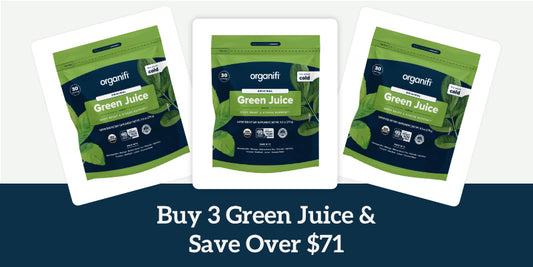Is coconut oil really bad for you? What are the benefits of olive oil? Why is corn oil bad for the environment?
Why is cooking oil suddenly so polarizing?
In the past, cooking oils in the Standard American Kitchen were some kind of unknown vegetable oil, a chunk of butter, or some Crisco “lard.” If you were really elegant, then you had some olive oil for your salads.
Nowadays, we have so many options it can often feel overwhelming. A visit to Wholefoods or Trader-Joe's can live you puzzled, and that’s before the recipe that asks for “black sesame oil” (seriously, what?)
For the environment and health-conscious: cooking oil matters.
Even if you’re drinking green juice, hitting the gym, and watching your macros regularly, there are small things we do almost unconsciously that put our bodies -and planet- at risk.
Your choice of cooking oil can affect mama earth, your weight loss goals, and your liver.
So, let’s unravel the cooking-oil-tangle and find your best match. So next time you’re in the fancy oil aisle you slide in ever-so-confidently, pick a brand worth your cash, and flick your hair on the way out.
Buying Cooking Oil: The Basics.
You probably know some of the benefits of olive oil, or that coconut oil is good for hair, but do you know what a smoke point is?
Yeah, me neither. (Before this post.)
We’ll get to the benefits of olive oil, coconut, avocado and more, in the next section. Not all oils are created equal and what you choose may help or hinder your liver (what does the liver do, if not process all that fat?), which you may not notice until you see the signs of unhealthy liver function.
Know The Smoke Point:
The temperature at which cooking oil starts to oxidize, break down and lose its nutritional and antioxidant power is the "smoke point." Naturally, you want to use oils that keep their nutritional value while cooking.
- Cooking oils with a low smoke point are better for salad dressings, and uncooked consumption.
- Oils with a high smoke point are better for cooking, frying, baking, and more. 400F and up is generally considered high.
Learn About Saturated Fats:
The total fat value of your favorite types of oil is usually the same, or pretty close. However, there are different types of fat in food and oils. Fat is necessary for energy and to absorb fat-soluble vitamins (A, K, D, and E) among others. Learn to read the label and make sure that you have a higher percentage of monounsaturated or polyunsaturated fat than of saturated fat.
However, don’t think saturated fat (the kind that turns solid at room temperature) is inherently bad for you. It withstands heat well, but has a tendency to raise cholesterol; it’s better in moderation.
Try Cold-Pressed Oil:
Oil comes from seeds, fruits, nuts, and vegetables. To get the benefits of olive oil, avocado or grapefruit, we must extract the natural fat from these sources using various methods. Heat degrades the oil’s structure, nutritional value, and flavor, so the lower the heat, the better.
Cold-pressed oils are extracted using pressure and little to no heat, which preserves the benefits of the foods virtually intact.
Choose Unrefined vs. Refined:
Unrefined oils were processed with little to no heat, as mentioned above these are cold-pressed or expeller-pressed oils. They’re generally labeled as pure, raw, virgin, and unrefined. Refined oils, on the other hand, have been deodorized, bleached, or chemically treated to maximize oil output at extraction - don’t be fooled by the name.
Unrefined oils are healthier; the popular benefits of olive oil come from Extra Virgin Olive Oil (EVOO), but due to the price tag people tend to go for the less effective refined version.
Pick Your Cooking Oil
Olive Oil:
Smoke Point: High 465 F
The benefits of olive oil are well documented: It’s rich in healthy polyunsaturated fats, antioxidants, lowers inflammation, improves blood vessel lining, regulates LDL cholesterol, could help fight Alzheimer’s and diabetes, and has a positive effect on body weight. Because it is a more expensive oil we miss out on the health benefits of olive oil in commercial kitchens, but it can be used for frying, deep-frying, sauteing, and as a dressing or emulsion.
The verdict: This could be your go-to oil for all your cooking needs. The benefits of olive oil are unmatched by other oils.
Extra Virgin Olive Oil (EVOO)
Smoke Point: Low 465 F
If the benefits of olive oil are remarkable, extra virgin olive oil takes it to a new level. It’s a cold-pressed oil which has more concentrated levels of antioxidants, monounsaturated fats, and an even better flavor. Not all “extra virgin” oil is real; it’s constantly counterfeited. The best way to find one is to know the manufacturers, so shop locally if possible.
The Verdict: Use it for salad dressings, dips, drizzled on its own, but not for high-temp cooking. It is the healthiest form of getting the benefits of olive oil.
Coconut Oil
Smoke Point: Low 359F
Even though coconut oil is solid at room temperature, it breaks down at 359F. It’s a good vegan substitute for butter in baking and raw recipes. It’s 90% saturated fat, so it could raise cholesterol levels, contribute to a fatty liver, and make you want to get that liver cleanse fast.
The Verdict: Use it carefully for baking and desserts, but avoid making it your only cooking oil. It can be used topically for skin and hair, but the benefits of olive oil beat it for cooking.
Avocado oil
Smoke Point: 510F
With one of the highest smoke points of vegetable and fruit oils, it’s the ideal choice for very high-temp cooking: like fried eggs, stir fry, and grilling. Because it is high in monounsaturated fats (the healthy ones) it’s good for both cooking and dressing. There may be environmental concerns, as avocado requires a lot of water to grow and CO2 emissions may be high due to transportation and import.
The Verdict: Use it for everything! We still like the benefits of olive oil better (we can shop local!) but Avocado Oil is our close second.
Sesame Oil
Smoke Point: Medium-High 410F
Good for sauteed meals and frying (although really, the less frying the better) it has a nutty to neutral flavor and many health benefits. It’s high in antioxidants, could help with arthritis, heart conditions, and blood sugar. There’s light and “black” sesame oil, the latter usually comes from toasted sesame seeds that make the nutty flavor stronger. Both are a healthy addition to your mix.
The Verdict: Use it when the recipe calls for it and in your own stir-fry concoctions. Its flavor may be too strong for some. It’s kind of on par with the benefits of olive oil, except for the taste.
Peanut Oil
Smoke point: High 440F
It’s great for frying and deep-frying, but it tastes strongly like peanuts so it’s not the best way to cook french fries. It’s high in the good monounsaturated fats and low in saturated ones, making it a good alternative. However, it goes bad fairly quickly so get it in a small container and keep it cool in the dark.
The Verdict: Use it for stir fry, sauteed, and deep-frying meals where the peanut flavor is desirable.
Grapeseed Oil
Smoke Point: Medium-High 420F
A byproduct of wine-making, grapeseed oil performs well in medium to low temperatures. It’s good for homemade mayo, sauces, and dressings. It’s been used in the beauty industry for its high Vitamin E content for skin and hair.
The Verdict: Use sparingly for low-temp sauteed recipes and emulsified preparations (like mayo.)
Sunflower Oil
Smoke Point: 440F
Made from sunflower (and sometimes safflower), it has less Omega 6 and “bad” fats than corn, canola, and other frying oils. Its high smoke point makes it a good alternative to those, while being overall healthier. It’s more sensitive to corruption, so purchase in small amounts.
The Verdict: If you must fry, use sunflower oil. Also good for baking and roasting.
Canola Oil
Smoke Point: High 450F
Canola oil is a refined GMO oil, high in Omega 6 fats and trans fats that comes from a cross-plant rapeseed breed made in Canada (hence CAN - OLA.) It’s cheap and therefore used in many processed foods today. It could lead to inflammation if consumed in excess.
The Verdict: Skip canola oil as much as you can, yes it’s good for frying and deep-frying, but you may need a liver cleanse soon. I’d still go with the benefits of olive oil.
Corn Oil
Smoke Point: High 450F
It’s a highly refined GMO oil, mostly made of polyunsaturated Omega 6 fats. It does have some Vitamin E content and phytosterols that help regulate LDL cholesterol, but it’s so high in Omega 6 and processed, that the health benefits are quickly gone.
The Verdict: Use with sparingly and with caution for frying. Next to canola, the least healthy cooking oil.
The Bottom Line:
There are many types of vegetable oil in the market, but the clear winner is Extra Virgin Olive Oil for salads and cold recipes; the health benefits of olive oil in it are stronger and more bioavailable. You can use coconut oil, avocado oil, and sunflower oil as healthy alternatives for baking and frying.
If these post has been eye-opening and you’re worried about your past Omega 6 fat intake, consider supporting your natural liver cleanse with a natural liver reset supplement.





1 comment
Very helpful information on oils, I. Have a clearer understanding on which oils to use for certain foods I normally prepare on a daily basis. I have ordered my supliments and look forward to the new healthy benefits it will bring me.Again thank you and keep educating us with with updated information.